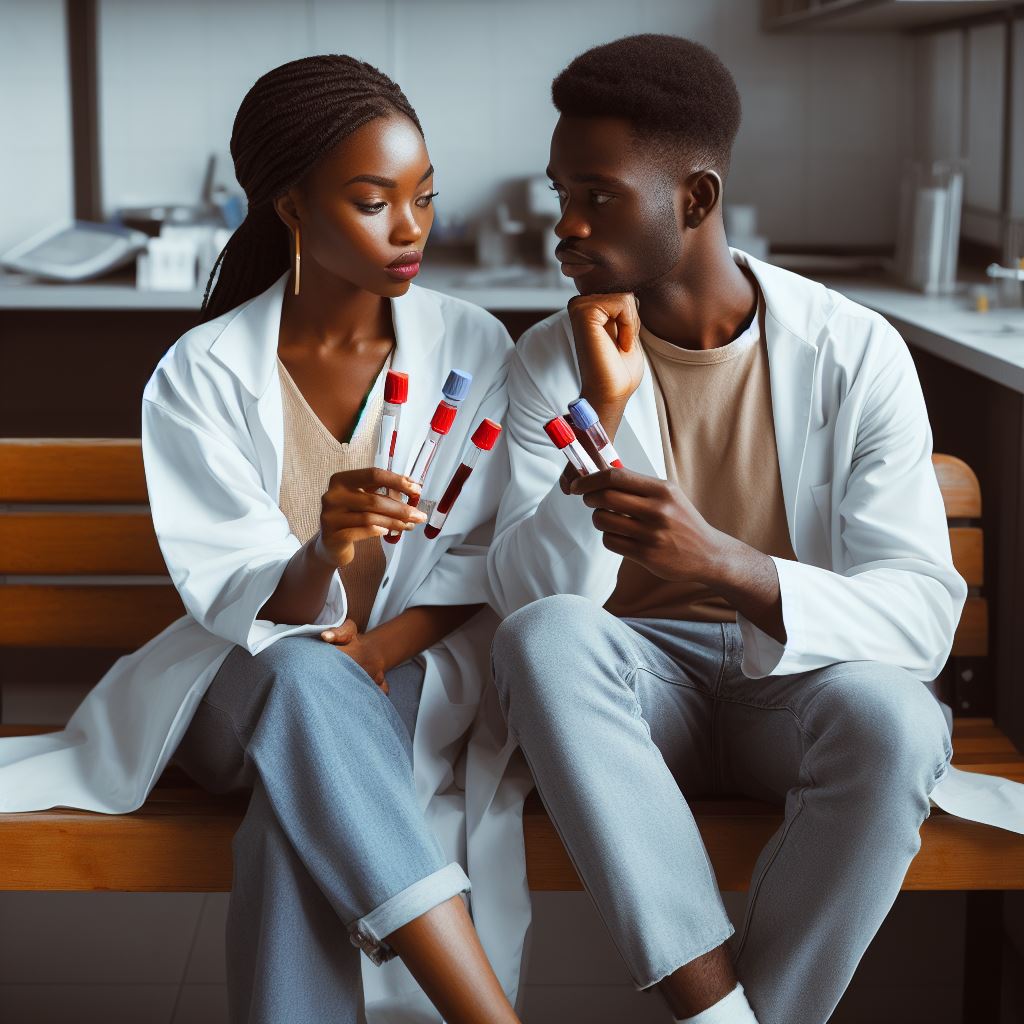Navigating Love and Science: Genotypes in Nigerian Weddings
Last Updated on January 28, 2024
Introduction
The topic of genotypes in Nigerian weddings
Genotypes play a crucial role in Nigerian weddings, influencing health considerations, family planning decisions, and overall well-being and compatibility of couples.
Understanding genetic compatibility is essential for navigating the complexities of marriage in Nigeria
Significance of genotypes in Nigerian culture
- In Nigerian culture, genotypes are significant as they can determine the likelihood of having a child with a genetic disorder.
- Genotypes hold significant cultural importance in Nigeria, impacting family dynamics, health decisions, and societal norms.
- Understanding and respecting genetic factors play a crucial role in the fabric of Nigerian culture.
The connection between love, science, and genotypes
Love and science intersect when it comes to genotypes as couples need to consider these factors before making a lifelong commitment.
Understanding Genotypes
What genotypes are and their importance in genetics
Genotypes refer to the genetic makeup of an individual, which determines their inherited traits and characteristics.
Understanding genotypes is crucial in genetics as it allows scientists to study the hereditary aspects of diseases, behaviors, and other features that are passed down through generations.
Different types of genotypes relevant to Nigerians (AA, AS, SS)
In Nigeria, three major genotypes are relevant: AA, AS, and SS. AA represents individuals with a normal genotype, where both copies of the hemoglobin gene are normal.
AS characterizes carriers of the sickle cell trait, with one normal and one sickle cell gene. SS refers to individuals with sickle cell disease, inheriting two sickle cell genes.
Health implications associated with each genotype
1. AA Genotype
- Individuals with AA genotype have no health implications related to sickle cell disease.
- They are less likely to experience complications associated with sickle cell anemia.
- Such individuals tend to have normal red blood cells, carrying oxygen efficiently throughout the body.
2. AS Genotype
- People with AS genotype are carriers of the sickle cell trait but do not develop the disease.
- They can pass the trait onto their offspring.
- Carriers usually have normal red blood cells but may experience mild symptoms during extreme conditions or dehydration.
3. SS Genotype
- Individuals with SS genotype have sickle cell disease.
- They inherit two sickle cell genes and are more prone to health complications.
- Sickle-shaped red blood cells can clog blood vessels, leading to pain, anemia, organ damage, and increased susceptibility to infections.
Additional points
- Understanding the health implications associated with different genotypes is extremely important, especially in the context of Nigerian weddings.
- When two individuals with the AS genotype come together, there is a 25% chance of having a child with SS genotype, who may develop sickle cell disease.
- It is essential for couples to be aware of their genotypes and potential risks to make informed decisions regarding family planning.
- By educating the Nigerian society about the significance of genotypes, individuals can make informed choices about their relationships, marriages, and family planning.
- Genetic counseling and comprehensive pre-marital testing can help identify potential health risks and enable couples to proactively manage their reproductive decisions.
In general, genotypes play a crucial role in genetics, and understanding them is vital in Nigerian weddings, where the prevalence of sickle cell disease is significant.
By discussing the various genotypes relevant to Nigerians (AA, AS, SS) and highlighting their associated health implications, individuals can make informed decisions and take necessary precautions to ensure the well-being of their future children.
Read: Why Genotype Testing is Essential Before Marriage
Cultural Beliefs and Genotypes
Cultural beliefs and superstitions surrounding genotypes in Nigerian society
- In Nigerian society, there are various cultural beliefs and superstitions surrounding genotypes.
- Some people believe that certain genotypes can bring bad luck or signify a cursed lineage.
- Superstitions are often rooted in ancient traditions and folklore, shaping the perceptions of genotypes.
- People may fear marrying into a family with certain genotypes due to these cultural beliefs and superstitions.
- These beliefs can create challenges for individuals with specific genotypes seeking acceptance and love.
How genotypes can affect marriage and relationships in Nigerian culture
- Genotypes play a significant role in marriage and relationships in Nigerian culture.
- Before entering a serious relationship, individuals often consider their genotypes and potential risks.
- Genotypes can determine the chances of having children with genetic disorders, leading to cautiousness.
- Some people prefer marrying someone with compatible genotypes to minimize the risk of passing down disorders.
- Genotypes can sometimes serve as a deciding factor when choosing a life partner in Nigerian culture.
Societal pressure and stigma associated with certain genotypes
- Nigerian society places societal pressure and stigma on individuals with certain genotypes.
- People with genotypes linked to genetic disorders may face discrimination and social exclusion.
- Due to fear of passing down genetic disorders, families may oppose marriages involving certain genotypes.
- Society’s perception of these genotypes can lead to couples feeling judged and marginalized.
- The stigma associated with certain genotypes can create emotional distress and strain on relationships.
These cultural beliefs and societal pressures create a dilemma for individuals with certain genotypes.
They find themselves seeking acceptance and love in a society that stigmatizes and discriminates against them based on their genetic makeup.
The struggle to find a partner who embraces their genotype can be overwhelming and disheartening. The journey towards love becomes intertwined with the complexities of genetics and cultural expectations.
To summarize, cultural beliefs and superstitions surrounding genotypes heavily influence Nigerian society’s perception of relationships and marriages.
These beliefs, sometimes rooted in ancient traditions and folklore, shape how individuals view specific genotypes.
The impact of genotypes on relationships is significant, with people often considering compatibility before committing to a partner.
However, the societal pressure and stigma associated with certain genotypes create additional challenges for individuals seeking love and acceptance.
Navigating love and science in Nigerian weddings requires understanding, empathy, and a willingness to challenge cultural norms for a more inclusive and loving society.
Read: The Link Between Sickle Cell and Marriage Genotype Concerns
Love and Genotypes
Impact of genotypes on love and relationships
- In Nigerian weddings, genotypes play a significant role in shaping love and relationships. Genotypes refer to a person’s genetic makeup, specifically concerning blood disorders like sickle cell anemia.
- Sickle cell anemia is prevalent in Nigeria, with a high percentage of the population carrying the sickle cell trait. This means that couples need to consider genotype compatibility before committing to a long-term relationship.
- Genotype compatibility is crucial as certain genotypes, such as AS and SS, can lead to serious health complications for their offspring.
- Couples with incompatible genotypes face the risk of having children with sickle cell disease, which affects their quality of life and places a strain on the relationship.
- Understanding the impact of genotypes on love and relationships is vital for couples to make informed decisions.
- It involves educating themselves about the different genotypes, the risks associated with each, and assessing their compatibility.
Challenges and dilemmas faced by couples with different genotypes
- Couples in Nigeria often face numerous challenges and dilemmas due to different genotypes. The main complication arises when two partners, each carrying the sickle cell trait, decide to form a union.
- These couples face the dilemma of potentially risking their future children’s health in search of love. The emotional toll of this decision can be immense, leading to doubts and uncertainty about their compatibility.
- Additionally, couples with different genotypes may encounter societal pressure and discrimination. Some families and communities disapprove of relationships that could result in sickle cell disease, complicating their journey towards love and acceptance.
The emotional aspect of navigating love and genotypes
- Beyond the scientific aspect, navigating love and genotypes involves traversing deep emotional terrain. The love between two individuals may be strong, but the presence of incompatible genotypes can create fear and anxiety about the future.
- Deciding whether to pursue a relationship requires introspection and open communication between partners. They must confront their fears and question whether they are willing to take the risk and potentially face challenges in the future.
- The emotional aspect also includes the sacrifices and compromises couples make for their relationship. Some might choose to prioritize love over the risk of having a child with sickle cell disease, while others may decide to end the relationship to prevent possible future hardships.
Ultimately, navigating love and genotypes in Nigerian weddings demands a delicate balance between scientific understanding, emotional resilience, and making informed choices that prioritize the well-being of the future generation.
Love alone cannot overcome the challenges posed by incompatible genotypes. Couples must consider all factors involved and seek support from medical professionals, families, and communities to make well-informed decisions about their relationship and potential family.
Read: Blood Group Basics: What Nigerians Need to Know

Find Out More: Polygamy in Nigeria: A Historical and Modern Perspective
Genetic Counseling and Nigerian Weddings
Concept of genetic counseling and its relevance to Nigerian weddings
- Genetic counseling involves the provision of information and support to individuals or couples who may have a risk of genetic disorders.
- Nigerian weddings are often elaborate affairs, and understanding the genetic risks associated with certain traits or diseases is crucial.
- Genetic counseling provides couples with the necessary knowledge to make informed decisions about their future.
- It helps them understand the likelihood of passing on genetic disorders and explore preventive measures.
- By offering genetic counseling, Nigerian weddings can prioritize the health and well-being of future generations.
Benefits of genetic counseling for couples with different genotypes
- Genetic counseling enables couples to comprehend the potential risks associated with their specific genotypes.
- With this knowledge, they can make informed decisions about starting a family.
- Couples can explore options like pre-implantation genetic diagnosis or adoption to have children without passing on genetic disorders.
- It reduces the emotional and financial burden of potentially caring for a child with genetic disorders.
- Genetic counseling strengthens relationships by fostering open communication and shared decision-making.
Role of genetic counseling in promoting healthy relationships and marriages
- Genetic counseling addresses potential conflicts and misunderstandings regarding genetic risks in relationships.
- It provides a platform for couples to discuss their genetic concerns openly and without judgment.
- Counselors offer support, easing the anxiety and stress associated with genetic risks.
- Understanding genetic risks allows couples to plan for the future, fostering a sense of security and stability.
- Genetic counseling helps couples make decisions together, leading to stronger relationships and healthier marriages.
In fact genetic counseling plays a vital role in Nigerian weddings by providing crucial information and support to couples.
By understanding their genetic risks, couples can make informed decisions about starting a family and explore preventive measures.
Genetic counseling also promotes healthy relationships and marriages by addressing potential conflicts and fostering open communication.
Ultimately, it empowers couples to prioritize the health and well-being of future generations.
Read: Understanding Genotype Compatibility for Marriage in Nigeria
Overcoming the Challenges
Tips and Strategies for Couples with Different Genotypes
- Seek genetic counseling to understand the potential risks and challenges associated with your genotypes.
- Stay informed about advancements in medical research and treatments related to your genotypes.
- Develop a strong emotional bond and open communication to navigate any issues that may arise.
- Create a healthy and supportive environment where both partners feel safe expressing their concerns.
- Consider undergoing pre-implantation genetic diagnosis or adoption if having biological children poses significant risks.
- Educate yourselves about lifestyle modifications and precautions that can minimize potential complications.
- Support each other mentally and emotionally, especially during times of uncertainty or difficult decisions.
- Seek guidance from religious or spiritual leaders who can provide moral support and guidance.
- Join support groups or online communities of couples facing similar challenges to gain insights and share experiences.
- Prioritize self-care and mental well-being by engaging in activities that reduce stress and promote relaxation.
Importance of Open Communication and Mutual Understanding
- Open communication is vital in a relationship where the partners have different genotypes.
- Discuss your concerns, fears, and hopes openly, allowing each partner to express their emotions without judgment.
- Listen actively and empathetically to your partner’s perspective, as it plays a significant role in fostering understanding.
- Acknowledge that each partner may have different experiences and challenges related to their genotypes.
- Be patient and understanding when conflicts arise, as navigating genotype-related issues requires compromise and empathy.
- Ensure that honesty and transparency guide your conversations to build trust and strengthen your bond.
- Seek professional help, such as couple’s therapy, to develop effective communication skills and resolve conflicts constructively.
Support Systems and Resources for Couples Facing Genotype-related Challenges
- Connect with organizations and associations specializing in genetic disorders to access support and resources.
- Consult with healthcare professionals experienced in managing genotype-related challenges.
- Stay informed about research institutions conducting studies on genotype-related conditions and their prevention.
- Utilize technology and digital platforms to access information, connect with experts, and seek advice.
- Engage with the broader community by participating in awareness campaigns and events related to genetic disorders.
- Involve friends and family members who are understanding and supportive of your situation.
- Take advantage of online forums and groups dedicated to providing emotional and informational support.
- Consider joining genetic counseling sessions together to understand and address any concerns as a couple.
- Develop a network of couples facing similar challenges to share experiences, advice, and emotional support.
- Remember that you are not alone and reaching out for support is a sign of strength and resilience.
Navigating the challenges that come with different genotypes in a relationship requires dedication, understanding, and a strong support system.
By implementing these tips and strategies, communicating openly, and utilizing available resources, couples can overcome difficulties and foster a loving and supportive partnership.
Remember, love can conquer any obstacle when approached with patience, empathy, and a shared commitment to overcome genotype-related challenges.
Conclusion
Recap the main points discussed in the blog post
- In this blog post, we discussed the importance of understanding genotypes in Nigerian weddings.
- It was highlighted that the knowledge of genotypes can prevent the birth of children with sickle cell disease.
- This information has significant implications for couples planning to get married or already married in Nigeria.
Reiterate the significance of understanding genotypes in Nigerian weddings
- Understanding genotypes can help individuals make informed decisions about their relationships and potential offspring.
- It allows them to navigate the challenges posed by genetic diseases and work towards healthier and happier futures.
Encourage readers to embrace love, science, and open-mindedness in their relationships
- We must encourage a mindset that values both love and science, as they complement each other in relationships.
- Open-mindedness is crucial in embracing scientific knowledge and incorporating it into personal decisions.
- By acknowledging the significance of genotypes in Nigerian weddings, we empower individuals to make informed choices.
- Love is a powerful force, but it should be accompanied by knowledge and understanding for the betterment of future generations.
- Let us strive to create a society where love, science, and open-mindedness coexist harmoniously in all relationships.
- Together, we can make a difference by embracing the knowledge and utilizing it in our personal lives.
- So, let us navigate the complex tapestry of love and science, hand in hand, towards a brighter future.


